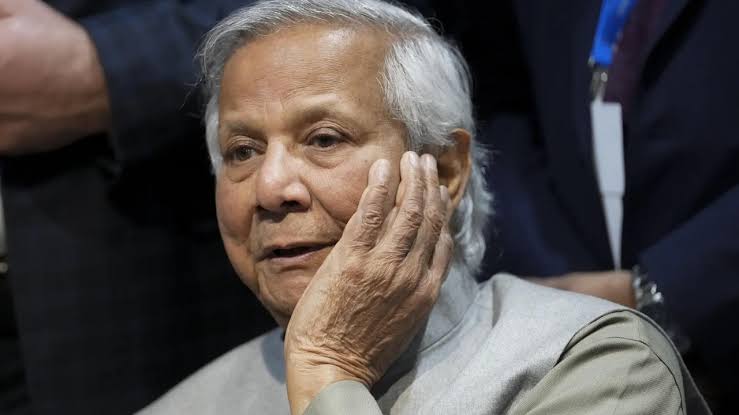Yunus’s dangerous dance with anti-Saudi conspirators

By Salah Uddin Shoaib Choudhury
In recent years, Bangladesh’s geopolitical positioning has become increasingly sensitive, especially as regional rivalries and global power dynamics intersect on its soil.
Amid such complexities, Yunus now appears to have walked into a dangerous trap set by hostile forces targeting Saudi Arabia — a move that could have serious consequences for Bangladesh’s diplomatic ties and the livelihoods of millions of its citizens.
The arrest of a little-known model, Meghna Alam, for allegedly blackmailing the former Saudi ambassador to Bangladesh, Issa bin Youssef Al-Duhailan, is more than just a criminal case — it reflects a deeply rooted and highly coordinated attempt to tarnish the image of Saudi royalty and destabilize relations between the two nations.
A little-known and controversial model Meghna Alam has come under the spotlight in local media and among certain international rights groups following her recent arrest in Dhaka.
According to media reports, Meghna was arrested by the Detective Branch of Dhaka Police following an “informal complaint” lodged by the recently departed Saudi ambassador, Issa bin Youssef Al-Duhailan. Police informed the media that they found “prima facie evidence” against an individual named Md. Dewan Samir, who allegedly attempted to extort US$5 million from Ambassador Al-Duhailan by “entrapping him with a beautiful woman [Meghna]”.
In the case filed at Dhaka city’s Vatara Police Station, 58-year-old Samir was identified as the Chief Executive Officer (CEO) of a company called Qawali and the owner of Sanjana Manpower.
Samir has reportedly been involved in human trafficking for a long time through his manpower company.
Additionally, members of Dewan Samir’s fraudulent syndicate use women as honey traps, primarily targeting foreign nationals and members of the diplomatic corps in Bangladesh.
The activities of this racket came to the attention of the intelligence agencies of Iran and Qatar, who subsequently tasked Samir with targeting Saudi Ambassador Issa bin Youssef Al-Duhailan.
In line with this assignment, Meghna Alam succeeded in establishing an intimate relationship with the Saudi ambassador and eventually began pressuring him to pay US$5 million.
Finding himself helpless, the ambassador sought assistance from the Yunus regime.
This is not the first time a Saudi diplomat has been targeted in Dhaka. In 2012, another deeply disturbing incident occurred — the assassination of Khalaf Al Ali, a senior diplomat who had served for two years as Head of Citizens’ Affairs at the Royal Embassy of Saudi Arabia in Bangladesh.
He was gunned down in the high-security diplomatic zone of Gulshan, Dhaka, late at night. The killing shocked both nations and cast a dark cloud over bilateral relations.
Though a man named Saiful Islam was eventually apprehended, tried, and executed in 2019 for the murder, many analysts and journalists — including myself — raised serious questions about the investigation and the legal proceedings.
The speed and secrecy of the trial, combined with inconsistencies in the case, suggest that a scapegoat may have been used to cover up a politically sensitive truth.
My own investigations and articles pointed to a high-ranking individual within Sheikh Hasina’s administration, who may have orchestrated the murder using a state intelligence agency.
Khalaf Al Ali had reportedly been meeting with opposition politicians and dissidents during late hours, possibly to report back to Riyadh — a move that may have sealed his fate.
Following the murder, relations between Dhaka and Riyadh turned frosty. There was significant anxiety among Bangladeshi expatriates in the Kingdom — over two million at the time — and the incident marked the beginning of diplomatic tension between the two nations.
Though relations were eventually mended to some extent, the deep scars of mistrust remained.
Now, the latest scandal involving Meghna Alam threatens to reignite those tensions. While the case is currently being portrayed as the handiwork of a crime syndicate attempting to extort foreign diplomats, the broader context paints a more troubling picture.
Her arrest comes at a time when religious extremists, including members of Al-Qaeda, ISIS, and other terrorist organizations, are publicly vilifying Saudi Crown Prince Mohammed bin Salman — calling him a puppet of the United States and Israel.
In Bangladesh, these extremists have resorted to publicly desecrating the Crown Prince’s image, including striking his photo with shoes, and uploading videos of these acts online.
Shockingly, the Yunus regime has taken no action against them, raising serious concerns about selective law enforcement.
According to a highly-placed source, members of the Iranian and Qatari missions in Dhaka have been funding and encouraging these anti-Saudi campaigns, exploiting local sentiment over the Gaza conflict.
The Crown Prince is being harshly criticized for his perceived reluctance to issue strong condemnations of Israeli military operations.
What’s more, several members of Nobel laureate Muhammad Yunus’s advisory council have joined in this criticism, portraying the Saudi leadership as having abandoned the Palestinian cause.
The situation becomes even more alarming when one considers the alleged role of the Pakistani mission in Dhaka.
According to intelligence sources, Pakistan is covertly supporting anti-Trump and anti-Mohammed bin Salman activities in Bangladesh, aiming to damage Riyadh-Dhaka relations to such an extent that Saudi Arabia might consider reducing or terminating the employment of the 4.3 million Bangladeshi workers currently in the Kingdom.
Their ultimate goal appears to be the replacement of these workers with Pakistani nationals — a move that would bring economic and diplomatic gains to Islamabad at the expense of Bangladesh.
Bangladesh must tread carefully in this perilous web of international intrigue. The targeting of Saudi diplomats — from the tragic murder of Khalaf Al Ali to the recent blackmail attempt against Ambassador Al-Duhailan — is not merely a series of isolated incidents.
These are calculated moves by regional and ideological adversaries of Saudi Arabia, who are using Bangladeshi soil and vulnerabilities to further their own agendas.
Dhaka’s failure to protect the dignity and safety of Saudi envoys, while turning a blind eye to jihadist incitement, could endanger vital bilateral ties and jeopardize the livelihoods of millions of its citizens working in the Kingdom.
The government must prioritize national interests, act with integrity and consistency, and ensure that Bangladesh does not become a pawn in a wider geopolitical game.




